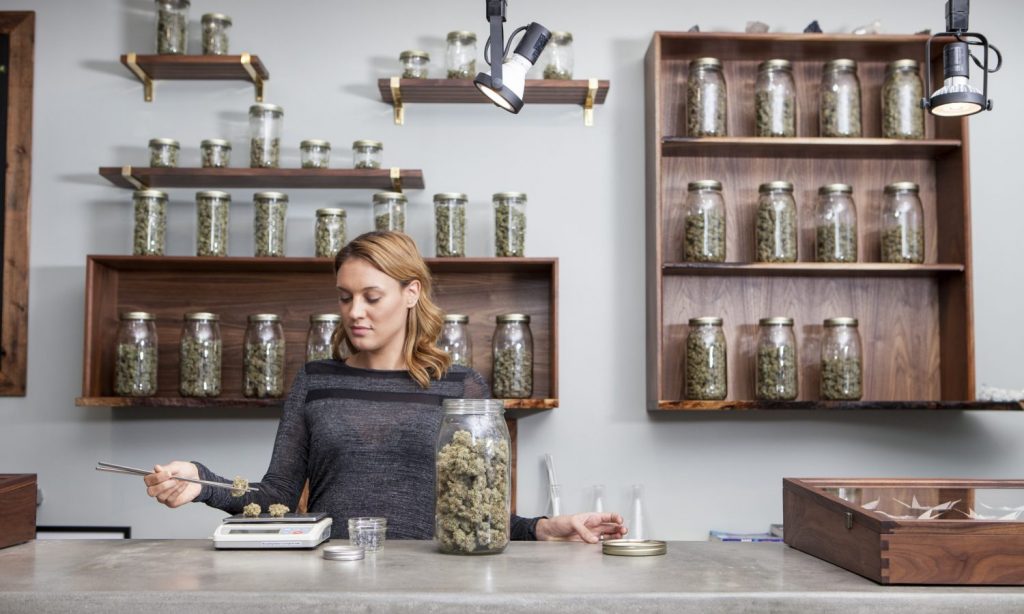
By Andrew Ward
Cannabis staffing leaders tell Benzinga that much of the industry is already back to pre-COVID in-person working arrangements.
Some of the market’s ancillary job functions did pivot and embrace the new digital arrangements. However, that was not the case for many and does not appear to be the reality for most going forward.

Several sources explained that cannabis and its early-stage maturation requires workers to be in-person to produce products, forge relationships and drive sales through face-to-face interactions. Therefore, working from home is unlikely to be an option for much of the workforce.
Many In Cannabis Never Left The Office
Much of the industry received its essential status early on during the pandemic. The distinction allowed producers, cultivators, retailers and others to remain open, using modified social distancing protocols.
“Many of these operations actually added additional on-site workers and spread them out over additional shifts in order to safely socially distance,” stated Kara Bradford, CEO of Viridian Staffing.
Bradford noted that a packaging facility client shifted its operations, splitting its ten-person staff into two working shifts to satisfy social distancing rules.
Still, some roles in non-plant-touching capacities and ancillary fields did head home during the pandemic’s peak.
There is a chance cannabis companies keep employees working remotely, but most don’t see that outcome playing out.
RELATED: 10 Best LinkedIn Cannabis Groups For Networking In The Weed Industry
Danielle Schumacher, co-founder and CEO of THC Staffing Group, sees work from home remaining in place under one condition. “I believe many will allow employees to continue working from home as long as it saves the company money,” she predicted.
Other staffing leaders, including Liesl Bernard, Cannabiz Team CEO, believe that most workers will head back to the office if they haven’t already.
“We just didn’t see the same level of interruption that other industries did, and cannabis will definitely bounce back faster in terms of the in-person workplace,” Bernard said, adding that workers from various sectors, spanning cultivation and retail to compliance and admin, are already working on-site or can expect to be back soon.
She added that some clients pivoted select roles to remote work during the pandemic but now are specifically stating in job listings that they expect to hold in-person interviews and have in-office operations.

“We see this as another strong indication of where the industry mindset is,” Bernard added.
One company embracing that vision is 4Front Ventures Corp. (OTC:FFNTF). As much of the market did during COVID, 4Front’s operations remained open, keeping much of the staff working in person.
“As an essential business, our cannabis retail and production facilities have never closed,” said Jill Vipond, 4Front’s human resources director.
For Most, The Future Of Cannabis Work Will Remain In The Office
While much of the market could head back to the office, not everyone sees the decision as the most efficient.
Like Schumacher, Bernard said that when assessing cost centers versus revenue generators that “these groups don’t necessarily need to head back into the office post-COVID as long as the infrastructure” is in place to support their work. She highlighted roles in marketing, accounting, payroll and select HR as possible long-term work-from-home candidates.
RELATED: Top 10 Jobs In The Cannabis Industry Right Now
Bernard noted that the previously mentioned roles, as well as legal and marketing, could also find themselves in a hybrid work arrangement. That said, most won’t have the option.
“It is very much an in-person industry that is built on meeting with people face-to-face and building a foundation of trust and connection,” said Bernard. She added, “This is difficult to do online or remotely.”
Vipond stated that 4Front has asked all its employees to return to the office, save for a few exceptions based on location, regular travel and for those who have an entirely tech-based role.
She cited relationship building and collaboration as primary reasons for the return to the office.
She added that most employees tend to do best in an office setting. “The vast majority of employees need structure and socialization to be a top performer and contributor, moving the company forward,” Vipond said.
This article originally appeared on Benzinga and has been reposted with permission.





